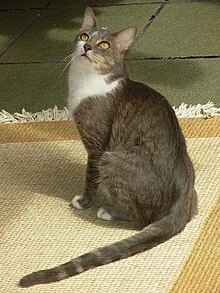Cat Wednesday 2022-10-26
Owning and interacting with pets, according to studies, can be a form of therapy for many. We have dedicated Saturday to dogs and Wednesday to cats, when we will post an article on each of those days. We will also post articles on occasion about other animals people may have as pets. – Editorial Team
Brazilian Shorthair
| Brazilian Shorthair | |
|---|---|
 |
|
| Origin | |
| Domestic cat (Felis catus) | |
The Brazilian Shorthair is a breed of cat. It is the first cat breed from Brazil to receive international recognition.
Description
The Brazilian Shorthair is a medium-sized cat of great agility. The breed can be distinguished from the American Shorthair by its sleek and elegant appearance, though cats of the breed are not as thin as the Siamese. The coat is short and close to the skin and comes in a wide variety of colors and patterns. The space between the eyes should be equal to the size of one eye. Brazilian Shorthairs have dramatically expressive eyes. They are longer than they are tall. Males have bigger heads than females.
The Brazilian Shorthair Cat had its beginning when the engineer Paulo Samuel Ruschi, a cat breeder and founder of the first Cat Federation in Brazil and the first Cat Club in Rio de Janeiro, had the idea to transform certain cats found in the streets of Brazil into a purebred cat. He focused on the Iberian Peninsula cats, brought to Brazil by the Portuguese in their ships around 1500 A.D. From North to South of Brazil, commissions were created by Dr. Paulo Ruschi to study this animal in all of the country’s parks and streets. After long years of experimental breeding program led by traditional breeders, the Brazilian Shorthair was finally approved by the World Cat Federation, with headquarters in Germany, as a Pure Breed cat. Nowadays, the Brazilian Shorthair cat can participate in contests all over the world.
Appearance
They have medium-sized and muscular bodies. The tail should not be broad at the base, and should slightly taper in the tip. Brazilian Shorthair cats have a slightly curved profile and large, pointed ears, and large, rounded eyes with colour that resembles the coat’s colour. The coat is very short, silky and glossy and with no undercoat. Minimal brushing is required. Almost all colours are possible.
Temperament
The Brazilian Shorthair is viable as an indoor as well as an outdoor cat, and is keen on human contact. They are very playful as a kitten. As they get older, they sober up a little, though they stay fairly active.
Origin
Its origins can be traced back to the streets of Brazil. Since going from a feral cat to a purebred, this breed has changed dramatically. This is not the first breed to be developed from street cats, as the American Shorthair, European Shorthair, and American Keuda all show.
In 1500 A.D., when the Portuguese arrived in Brazil for the first time, they brought with them felines descended from the Felis Iberia to protect food from rodents. Those cats represent the founding lineage of the beautiful, loving, healthy Brazilian Shorthair purebred cat.
History
The breed had developed without rules or special cares; until, in the 1980s, Brazilian-born engineer Paulo Samuel Ruschi, a cat breeder currently living in New York City, started to settle the rules for the breed after deciding to study genetic and morphological aspects of the cats running in parks, gardens and streets of several cities in Brazil. He noticed that the country had unique cats, and yet, that those street cats had the same appearance and features. Those are the characteristics that define the Brazilian Shorthair cat. In 1998 the World Cat Federation, the largest Cat Federation in the world, gave a status of “approved breed” to the first and only Brazilian Recognized Purebred Cat, now with more than 10 generations of pedigreed cats.
Source: Wikipedia under Creative Commons License.

